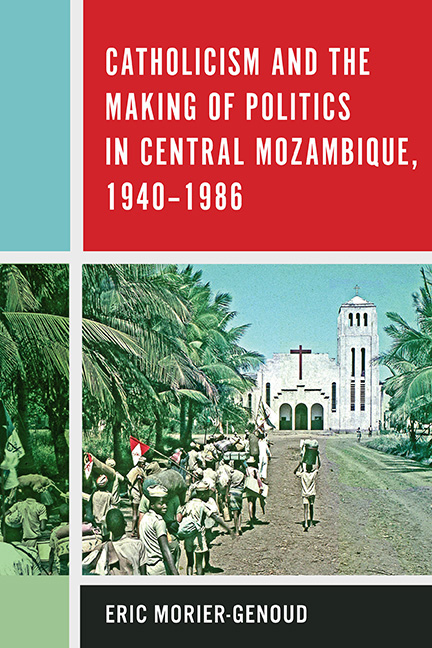Book contents
- Frontmatter
- Dedication
- Contents
- List of Illustrations
- Acknowledgments
- Note on Translations
- List of Abbreviations
- Introduction
- 1 The Making of the Diocese of Beira
- 2 Diversity and Dynamics of the Imperial Church
- 3 The Formation of an African Church
- 4 Gathering Storm: Vatican II Meets African Nationalism
- 5 Decolonization? War, Implosion, and the Vatican
- 6 Independence: Revolution and Counterrevolution
- Epilogue
- Notes
- Bibliography
- Index
- Frontmatter
- Dedication
- Contents
- List of Illustrations
- Acknowledgments
- Note on Translations
- List of Abbreviations
- Introduction
- 1 The Making of the Diocese of Beira
- 2 Diversity and Dynamics of the Imperial Church
- 3 The Formation of an African Church
- 4 Gathering Storm: Vatican II Meets African Nationalism
- 5 Decolonization? War, Implosion, and the Vatican
- 6 Independence: Revolution and Counterrevolution
- Epilogue
- Notes
- Bibliography
- Index
Summary
In 1971 the war of liberation in Mozambique entered its seventh year. It had not reached the Diocese of Beira yet, but the church there was facing a deep crisis all the same. The clergy was profoundly divided over theology and politics. An increasing number of religious and lay individuals condemned the alliance between the Vatican and the Portuguese colonial state (an alliance formalized in 1940 by a concordat and a Missionary Accord) and favored African nationalism and the independence of Mozambique. Some missionaries were even helping Africans join the liberation struggle and fight the war in the neighboring Diocese of Tete. At the same time, other missionaries in Beira diocese, mostly of Portuguese nationality, opposed African nationalism and remained faithful to the Portuguese colonial state and project. They believed in the Portuguese Empire, or its reform, and supported its fight to keep “terrorism” and “communism” at bay. When the war finally reached the Diocese of Beira in 1973, these missionaries increased their collaboration with the authorities, and some of them went on to actively support the army and the state security police.
The division of the clergy in Beira in the 1970s was not just political in nature. It was theological too, with heated debates about what kind of pastoral approach the Catholic Church and its clergy should adopt, which church model it should favor, and to whose benefit. Most of the Portuguese missionaries (primarily Jesuits and Franciscans) were in favor of a pastoral approach that focused on converting Africans to a Portuguese-centered Catholicism. They wished for a religious and cultural conversion, and their means remained classic, focused on infrastructure and schooling. In contrast, many foreign missionaries, particularly the White Fathers and the Picpus fathers, as well as some secular Portuguese priests and some sisters, tried to build a locally centered Mozambican church, linked to the Vatican, relying on the laity, and using African forms of liturgy—following the lead of the Second Vatican Council. A few missionaries from the Instituto Español de Misiones Extranjeras (Spanish Institute of Foreign Missions, also called “Burgos fathers”) went further. They promoted a theology of liberation, inspired by the work of their institute in Latin America. They wanted small base communities and not a hierarchical administration or Vaticancentered institutions.
- Type
- Chapter
- Information
- Publisher: Boydell & BrewerPrint publication year: 2019



